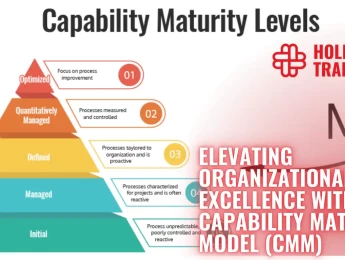- Table of Contents
- What Is Company Reputation?
- Why Brand Reputation Is Important in Business
- Customer Trust and Loyalty
- Competitive Advantage
- Employee Recruitment and Retention
- Investor Confidence
- Crisis Resilience
- Risks Your Company Reputation Might Face
- 1. Product or Service Failures
- 2. Ethical Lapses
- 3. Negative Publicity
- 4. Data Breaches and Privacy Concerns
- 5. Poor Customer Experience
- How to Strengthen Your Company's Public Image
- 1. Deliver on Promises
- 2. Focus on Customer Experience
- 3. Build Strong Relationships
- 4. Demonstrate Ethical Practices
- 5. Effective Communication
- 6. Social Responsibility
- 7. Crisis Preparedness
- 8. Employee Advocacy
- The Effectiveness of Good PR in Building Company Reputation
- Conclusion
In today's highly interconnected and competitive business landscape, company reputation plays a pivotal role in shaping success. A company's reputation, often called its brand reputation, is the perception and collective opinion of various stakeholders about the organisation and its offerings. It culminates in a company's values, actions, and interactions with customers, employees, partners, and the public. This blog post explores the concept of company reputation, delves into why it is essential for businesses, identifies potential risks to reputation, and offers strategies for strengthening and maintaining a positive public image.
What Is Company Reputation?
Company reputation encompasses stakeholders' beliefs, opinions, and attitudes towards an organisation. It is influenced by several factors, including the company's products or services, customer experiences, corporate culture, social responsibility initiatives, and communication efforts. Reputation is not solely built on what a company claims but on how it consistently behaves and delivers value to its stakeholders. A positive reputation can foster customer loyalty, attract top talent, enhance credibility, and ultimately lead to long-term business growth.
Factors | Influence on Reputation |
Products/Services Quality | High-quality offerings build trust and customer loyalty. |
Customer Experiences | Exceptional service fosters positive opinions and loyalty. |
Corporate Culture | A positive workplace culture enhances both employee and customer satisfaction. |
Social Responsibility Initiatives | Community engagement and ethical practices enhance public perception. |
Communication Efforts | Transparent and effective communication strengthens relationships with stakeholders. |
Table 1: Factors influencing company reputation
Why Brand Reputation Is Important in Business
In today's highly competitive and interconnected business environment, brand reputation is not just a nice-to-have; it's a strategic imperative. Let's explore the key reasons why a strong brand reputation is vital for businesses:
Customer Trust and Loyalty
A positive reputation is the bedrock of trust. Trust is the foundation upon which strong customer relationships are built. In fact, 25% of a company’s value is determined by customers based on its online reputation. When customers perceive a brand as reliable, ethical, and customer-centric, they are likelier to choose and remain loyal to it. They trust that the products or services they receive will consistently meet or exceed their expectations.
Consider this: in the digital age, where information is readily accessible, consumers often turn to online reviews and social media to make purchasing decisions. A study conducted by the Spiegel Research Center at Northwestern University found that online product reviews can significantly impact sales. Positive reviews can increase conversion rates by up to 270%. Such statistics emphasise the direct relationship between a brand's reputation and its bottom line. Customers are more inclined to engage with and buy from companies with established, positive reputations.
Competitive Advantage
A strong reputation sets a company apart in a crowded marketplace with numerous companies offering similar products or services. When potential customers are faced with choices, they often rely on their perception of a brand's reputation to make decisions. A positive reputation acts as a powerful differentiator, providing a competitive edge.
For example, consider the smartphone industry. Many companies offer smartphones with similar technical specifications. However, Apple's reputation for innovation, quality, and customer experience sets it apart from competitors. This reputation allows Apple to charge premium product prices while enjoying unwavering customer loyalty. Other companies may offer similar features but often struggle to command the same level of loyalty and premium pricing.
A strong reputation influences consumers to choose one brand over another, even when comparable products or services. It can lead to increased market share, higher customer retention, and the ability to set premium prices.
Employee Recruitment and Retention
Brand reputation extends beyond the customer base; it significantly impacts an organisation's ability to attract and retain top talent. In today's competitive job market, talented professionals can choose where they work. They often seek employers that align with their values, offer a positive work environment, and provide opportunities for growth and advancement.
A company with a positive reputation is more likely to attract talented employees who want to be associated with an organisation known for its ethical practices, positive work culture, and potential for personal and professional development. A study by Review 42 found that a staggering 69% of job hunters would reject job offers from companies with unfavourable reputations. This statistic underscores the importance of reputation in acquiring customers and attracting and retaining skilled and motivated employees.
An organisation with a strong reputation tends to have a happier, more committed workforce. When employees believe in their company's mission and values and feel proud to be associated with it, they are more likely to be engaged and perform at their best. This, in turn, positively impacts the company's productivity and innovation.
Investor Confidence
Investors play a pivotal role in a company's growth and success. They provide the capital needed for expansion, research and development, and operational improvements. Investors are not only concerned with financial performance; they also assess a company's reputation.
A company with a solid reputation is viewed as a safer investment. It reflects stability, ethical practices, and the potential for long-term profitability. Investors are more likely to back companies with a reputation for sound corporate governance, transparency, and strong ethical values. This investor confidence can lead to increased funding, partnerships, and opportunities for growth and innovation.
On the other hand, a company with a tarnished reputation may find it challenging to attract investors. Concerns about unethical conduct, poor governance, or reputational risks can deter potential financial backers. Therefore, a positive reputation attracts customers and employees and fosters investor confidence, creating a favourable environment for growth and sustainability.
Crisis Resilience
In the unpredictable world of business, challenges and crises are inevitable. Companies with a strong reputation are better prepared to weather these storms. A well-established positive reputation is a reservoir of goodwill and trust that can be drawn upon during difficult times.
For instance, when a company faces a product recall, negative media coverage, or a public relations crisis, the trust and credibility it has built over time provide a buffer. Stakeholders, including customers and investors, are more forgiving and supportive of companies they trust. They are more likely to believe in the company's commitment to rectifying mistakes, accepting responsibility, and giving the company a second chance. In contrast, companies with weak or damaged reputations may find it exceedingly difficult to recover from similar situations.
In summary, brand reputation is not just a marketing concept; it's a strategic asset that influences every facet of a company's performance. It fosters customer trust and loyalty, provides a competitive advantage, attracts and retains top talent, garners investor confidence, and enhances crisis resilience. Recognising the significance of reputation management and taking proactive steps to build and maintain a positive reputation is essential for long-term business success in today's highly competitive and interconnected world.
Risks Your Company Reputation Might Face
In the digital age, where information travels quickly, and public opinion can make or break a brand, safeguarding a company's reputation is paramount. Several potential risks can threaten a company's reputation, and being aware of these risks is the first step towards effective reputation management. Let's explore these risks in detail:
1. Product or Service Failures
Product or service failures are one of the most significant threats to a company's reputation. When a company's offerings fail to meet customer expectations due to poor design, quality control issues, or inadequate testing, it can lead to widespread dissatisfaction. Negative experiences can quickly be shared on social media platforms and review websites, damaging the company's reputation and eroding consumer trust.
Preventing this risk involves rigorous quality control measures, comprehensive testing, and a responsive customer support system. If necessary, proactive communication about product improvements and recalls can also mitigate the damage caused by product failures.
2. Ethical Lapses
Ethical misconduct, such as fraud, dishonesty, or negligence regarding environmental or social responsibilities, can severely tarnish a company's reputation. Unethical behaviour erodes stakeholder trust and can lead to legal consequences and financial losses. Upholding ethical standards in all aspects of business operations, promoting a fair and inclusive workplace, and embracing environmental sustainability are essential measures to prevent ethical lapses.
Companies must foster a culture of integrity and transparency, where employees are encouraged to report unethical behaviour without fear of retaliation. Regular ethics training and clear ethical guidelines can reinforce the importance of ethical conduct among employees.
3. Negative Publicity
In the age of social media, negative publicity can spread like wildfire. Negative media coverage, critical online reviews, or social media backlash can quickly harm a company's reputation, especially when left unaddressed. Social media platforms amplify the reach of negative content, making it crucial for companies to be vigilant and responsive.
Effective reputation management involves monitoring online conversations, addressing negative comments promptly, and providing accurate information to counter misinformation. Engaging with dissatisfied customers publicly and demonstrating a genuine commitment to resolving their issues can turn negative experiences into positive ones, showcasing the company's dedication to customer satisfaction.
4. Data Breaches and Privacy Concerns
As businesses increasingly rely on digital platforms to store customer data, mishandling or compromising customer information can damage reputation. Data breaches and privacy concerns erode trust and confidence in a company's ability to protect sensitive information. Customers expect their data to be handled securely, and any breach of this trust can have long-lasting repercussions.
Companies must invest in robust cybersecurity measures, including encryption, regular security audits, and employee training on data protection best practices to mitigate this risk. Transparent communication during and after a data breach and measures to rectify the situation and prevent future breaches are essential to rebuilding customer trust.
5. Poor Customer Experience
Providing subpar customer experiences, such as inadequate support, unresponsive communication, or unresolved complaints, can damage a company's reputation and drive customers away. Negative experiences can lead to negative reviews, social media complaints, and, ultimately, a loss of customer loyalty.
To prevent this risk, companies must prioritise customer satisfaction at every touchpoint. Listening to customer feedback, addressing concerns promptly, and implementing improvements based on customer suggestions can enhance the overall customer experience. Empowering customer support teams to resolve issues efficiently and demonstrating empathy and understanding can turn dissatisfied customers into loyal advocates.
In short, understanding and mitigating these reputation risks are essential for companies aiming to thrive in the competitive business landscape. By proactively addressing these challenges through ethical conduct, transparent communication, excellent customer service, and robust cybersecurity measures, companies can safeguard their reputation, build trust with stakeholders, and ensure long-term success in the ever-evolving business world. Reputation management isn't just a defensive strategy; it's a proactive approach that strengthens a company's resilience and fosters positive relationships with its customers, employees, investors, and the wider community.
How to Strengthen Your Company's Public Image
Building and maintaining a positive public image is essential for businesses looking to establish trust, credibility, and lasting relationships with their stakeholders. Here are the key strategies to strengthen your company's public image:
1. Deliver on Promises
Consistency is paramount when it comes to building trust. To strengthen your company's public image, it's essential to consistently deliver on the promises you make to your customers and other stakeholders. Ensure that the quality of your products or services matches or exceeds the expectations set by your marketing campaigns. Transparent communication about your offerings and an emphasis on fulfilling commitments build credibility and trust.
Assess customer feedback and market trends regularly to align your offerings with evolving demands. By demonstrating a commitment to delivering value, you instill confidence in your customers, encouraging loyalty and positive word-of-mouth recommendations.
2. Focus on Customer Experience
Exceptional customer experiences are a cornerstone of a positive public image. Prioritise customer satisfaction at every stage of the customer journey. Actively listen to customer feedback through surveys, social media, and customer support interactions. Address concerns promptly and strive to exceed customer expectations.
Invest in customer service training for your staff, enabling them to handle customer issues and provide effective solutions empathetically. Personalised interactions and a customer-centric approach foster positive emotional connections with your brand. Customers who feel valued and understood are likelier to become loyal advocates, championing your company in their social circles.
3. Build Strong Relationships
Positive relationships with stakeholders, including customers, employees, suppliers, and the local community, are invaluable assets. Engage in open dialogue and demonstrate transparency in your actions and decision-making processes. Actively participate in initiatives that benefit society, showcasing your company's commitment to social responsibility.
Internally, foster a positive workplace culture where employees feel valued, empowered, and motivated. Engaged and satisfied employees are more likely to represent your company positively both within and outside interactions.
Externally, collaborate with suppliers who share your ethical values and standards. Building strong, mutually beneficial relationships with your suppliers ensures the integrity of your supply chain and reinforces your reputation for responsible business practices.
4. Demonstrate Ethical Practices
Operating with integrity and transparency is fundamental to strengthening your company's public image. Uphold ethical standards in all aspects of your business operations, from production processes to marketing strategies. Promote fair treatment of employees, emphasising diversity, equity, and inclusion in the workplace. Embrace environmentally responsible practices, showcasing your commitment to sustainable business operations.
Communicate your ethical initiatives regularly to your stakeholders through various channels, such as your website, social media platforms, and annual reports. Transparency about your ethical practices builds trust and enhances your reputation as a socially responsible organisation.
5. Effective Communication
Effective communication is the linchpin of public image management. Develop a comprehensive communication strategy that ensures your company's values, mission, and achievements are effectively communicated to stakeholders. Regularly engage with the public through various channels, including social media, blogs, press releases, and community events.
Transparent communication is especially critical during challenging times or crises. Timely and honest communication and a commitment to rectify mistakes can help mitigate potential damage to your reputation. Engage with negative feedback constructively, addressing concerns and showcasing your dedication to continuous improvement.
6. Social Responsibility
Embracing corporate social responsibility (CSR) is not just a business trend; it's a powerful tool for strengthening your company's public image. Not only that, statistics also show that implementing CSR strategies can shield companies from approximately 7% in revenue losses. Companies prioritising purpose are significantly more attractive to potential employees, with a staggering 78% increase in the likelihood of individuals desiring to work for such organisations. Actively engage in philanthropic activities, supporting community initiatives, educational programmes, and charitable organisations. Adopt sustainable business practices, minimising your environmental impact and contributing to the planet's well-being.
CSR initiatives demonstrate your commitment to societal welfare and enhance your reputation as a socially conscious organisation. Engage your employees in volunteer activities, encouraging them to participate in community service programmes actively. Positive contributions to society create a favourable perception of your company, fostering trust and admiration among your stakeholders.
7. Crisis Preparedness
Anticipating and preparing for crises is a hallmark of responsible reputation management. Develop a robust crisis management plan that outlines clear protocols for handling various types of crises, from product recalls to negative media coverage. Identify potential risks specific to your industry and company, and establish communication strategies tailored to each scenario.
Train your crisis management team to respond swiftly, honestly, and empathetically during challenging situations. Timely communication, combined with decisive actions and a commitment to rectifying mistakes, can help mitigate potential damage to your reputation. By being prepared and responsive, your company can navigate crises resiliently, preserving stakeholder trust and confidence.
8. Employee Advocacy
Your employees are your most valuable advocates. Fostering a positive work culture is essential for employee satisfaction and strengthening your company's public image. Provide professional development opportunities, recognise and reward employee achievements, and encourage a sense of pride in being associated with your organisation.
Empower your employees to become brand ambassadors. Encourage them to share their positive experiences working for your company on social media and professional networks. Employee testimonials, blog posts, and social media endorsements authenticate your company's public image, resonating with potential customers and partners.
In summary, strengthening your company's public image requires a holistic and proactive approach. Your company can build a robust and positive public image by consistently delivering on promises, focusing on exceptional customer experiences, building strong relationships, demonstrating ethical practices, engaging in effective communication, embracing social responsibility, preparing for crises, and empowering employee advocacy. Investing in these strategies enhances your reputation and fosters long-term trust and loyalty among your stakeholders, positioning your company for sustainable success in the competitive business landscape.
The Effectiveness of Good PR in Building Company Reputation
Effective public relations (PR) is crucial in shaping and managing a company's reputation. PR professionals excel at crafting compelling narratives that align with the company's values, vision, and goals. By strategically communicating these stories to the public, PR efforts shape public perception, enhance brand reputation, and establish credibility.
PR also involves building positive media relationships and collaborating with journalists, reporters, and influencers to ensure accurate and favourable coverage of the company. These relationships lead to media opportunities such as interviews, feature articles, and press releases, which help showcase the company's strengths, achievements, and positive initiatives. Additionally, PR plays a vital role in crisis management, providing timely and transparent communication during challenging situations. PR professionals develop crisis communication strategies, handle media inquiries, and engage stakeholders to protect the company's reputation and rebuild trust.
This isn’t an easy skill set to acquire, so one thing you can do to learn more about it and excel in it is to take some courses that’ll help equip you with the knowledge you need regarding PR and media skills. We’ve got a wide range of training programmes that help you do just that, so make sure you contact us for more information.
Conclusion
Company reputation is a valuable intangible asset that significantly impacts business success. Maintaining a positive reputation requires a proactive approach, focusing on building trust, delivering value, and effectively engaging with stakeholders. By prioritising customer experiences, ethical practices, effective communication, and social responsibility, companies can cultivate a strong public image that supports long-term growth, resilience, and competitive advantage in an ever-evolving business landscape.
In today's fast-paced business world, mastering the art of reputation management is essential. Our course, ‘Public Relations and Media Skills in Action,’ offers you the expertise and practical insights needed to navigate the complexities of effectively building and safeguarding your company's reputation. Enrol now and unlock the secrets to shaping a positive public image that propels your business toward unparalleled success, turning challenges into opportunities and setbacks into triumphs. Don't just manage your reputation; elevate it to new heights with our transformative course.






















